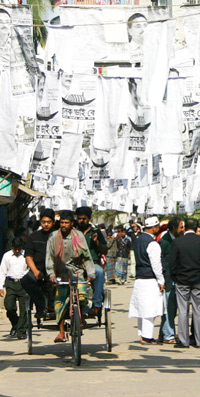The international community is far less tolerant of corruption than it was only 20 years ago. There is a growing outrage from civil society and research has increasingly demonstrated the negative effects of corruption on political stability, economic growth and poverty alleviation. One could say that anti-corruption is “hip”.
This trend is also reflected in national politics.
Politicians trying to win favour with their constituents flout the anti-corruption message as an important platform to run with what resonates with the electorate.
Campaign pledges to “put an end to corruption”, to “wipe out corruption” or to “make corruption history” have become widespread as politicians have understood that integrity is a priority for voters. But in many cases, these pledges and campaign trail promises remain just that. Here are some examples of unfulfilled anti-corruption pledges:
- In early 2008 during the Russian presidential elections, candidate Dmitry Medvedev put corruption forward as an important issue for the country and prepared a National Anti-Corruption Plan – including the promise to adopt an anti-corruption law to clarify the procedures for appointing judges and to develop mechanisms to prevent conflicts of interest. Medvedev’s administration ticked major boxes in its anti-corruption agenda, but substantial changes are yet to be seen due to the lack of political will in enforcing these laws and mechanisms. Experts say that neither Vladimir Putin nor Medvedev proved that they were taking the fight against corruption seriously as the reforms created little real change for ordinary citizens. Read more about Russia’s anti-corruption predicament here.
- In 2007, candidate Nicolas Sarkozy signed Transparency International France’s anti-corruption pledge, committing to enhancing the protection of whistleblowers, to include the topic of corruption in civic education curricula, to promote the anti-money laundering agenda, to broaden and strengthen asset declarations and reinforce the judiciary and political finance watchdogs. During his presidential mandate, Sarkozy took a few steps forward in the fight against corruption, but did not tackle the most serious corruption risks of the country – namely the lack of an independent judiciary, the weakness of political finance watchdogs and the collusion between the economic and political elites. Read Transparency International France’s analysis here.
- The 2009 elections put the fight against corruption high on the agenda of Bangladeshi politicians. The ruling alliance, namely the Bangladesh Awami League, made “taking effective actions against corruption” one of its five electoral pledges. The party’s manifesto promised to take measures to eliminate bribery and extortion, and to curtail leaders’ abuse of power. The government has since passed a number of laws, but their implementation is inconsistent. In addition, a set of amendments was introduced – but not adopted, thanks to civil society’s outrage – to weaken the Anti-Corruption Commission. Patronage networks and political interference remain a major problem in Bangladeshi politics.
But here is the good news: citizens can play a role in holding their leaders accountable for campaign pledges and a number of tools and approaches have already been developed to help them do so. These are only a few examples of such initiatives:
The Polish NGO Mam Prawo Wiedziec (“I have a right to know”) has developed an app to crowd-source the collection of promises ahead of the local elections that will take place in 2014. To prevent candidates from making empty promises during their campaign trails, Mam Prawo Wiedziec encourages citizens to capture electoral promises on the go through photos of posters and recordings of speeches. The aim is to contribute to the NGO’s wider objective of collecting and organising candidates’ promises on its web platform.
In France, the newspaper Le Monde together with Lui President, a website created by three journalism students, uses data visualisation to track whether the government has kept its anti-corruption promises.
The Cambodian Committee for Free and Fair Elections (COMFREL) works to increase the accountability of elected officials by monitoring their performance and the fulfilment of campaign pledges using voter scorecards.
What other initiatives have you come across in your part of the world? Share your examples in the comments box below!
















 Connect with us on Facebook
Connect with us on Facebook Follow us on Twitter
Follow us on Twitter